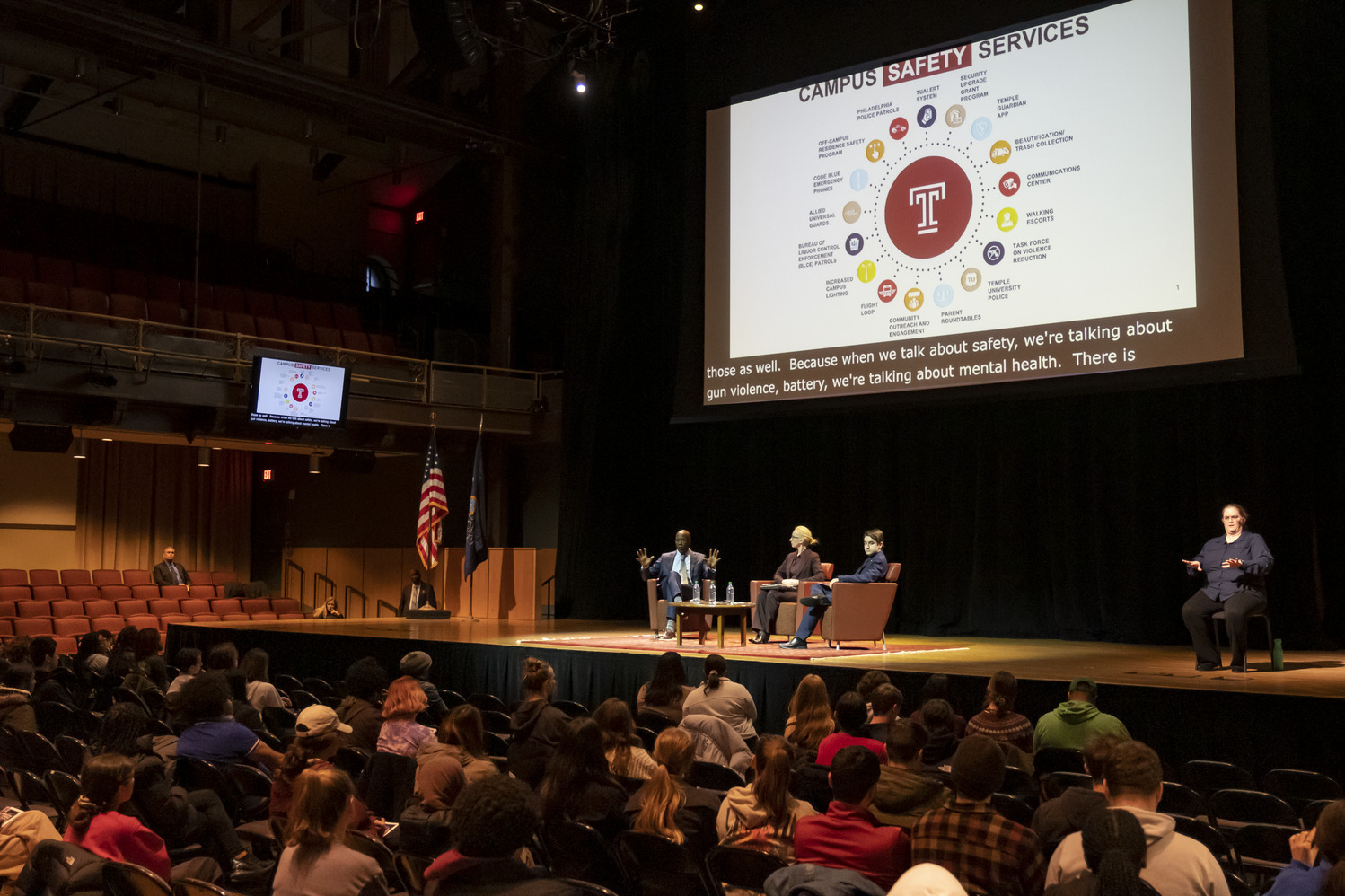Temple Student Government (TSG) recently hosted two town halls for students to meet with President Jason Wingard and Vice President for Public Safety Jennifer Griffin. In response to student requests for more communication and transparency, the sessions focused on improving education and engagement on campus safety issues.
“This is the top priority for our university right now,” Wingard said later. “It is imperative that our students, and the entire campus community, remain safe while benefiting from a leading-quality educational experience.” In addition to the town halls, Wingard and Griffin are continuing to host meetings with small groups of students and parents, to strengthen the dialogue and collaboration surrounding safety and mental health issues.
More than 100 students attended the two hourlong town halls at the Temple Performing Arts Center. The first was held on the evening of Jan. 23, and the second in the morning of Feb. 2. TSG President Gianni Quattrocchi led the first dialogue with questions submitted online by students. In response to student feedback, TSG modified the format for the second town hall to enable attendees to pose questions to the panelists in person. Students shared their frustrations and fears on various topics, from off-campus safety to police staffing levels.
Sidra Sheikh, a Temple graduate student who has studied urban education and school safety, attended the Feb. 2 town hall. “I got to meet the new head of public safety, so that was pretty cool, and it was really nice that they were looking for student engagement,” Sheikh said.
Sheikh believes the university should look beyond crime indicators and police reports to measure its progress. “Temple shouldn’t feel like a fortress. It should feel like we’re embedded in the city,” Sheikh said. “I think the effort on safety should be more about belonging. How do we make students feel like they belong and are more connected to the community? There need to be greater opportunities for connections to the community. The students are not going to seek out those opportunities on their own.”
Rachel Bromberg, a podiatry student, believes that many of Temple’s first-year students need more awareness and understanding of their environment in North Philadelphia. She told Wingard and Griffin that a seminar on safety and self-defense, with annual refresher classes, would help.
Both town halls included an informational segment by Wingard and Griffin, reviewing university priorities, security measures and patrol maps. Wingard emphasized that Temple leadership is fully committed to engaging, collaborating and communicating with students, faculty, staff and the larger community of business and neighborhoods on how we can work together to create a safer environment. He explained that hiring Griffin into a newly elevated vice president position is intended to help ensure smart use of current resources, while exploring the opportunities for growth, reorganization and collaboration.
Griffin explained that numerous layers of security initiatives and strategies make up Temple’s approach to safety. They include Temple police and security officers; the dispatch team; technology; and partnerships with groups like the Philadelphia Police, the FBI and neighborhood businesses. In addition, mental health initiatives are another crucial part of keeping students safe. “This isn’t going to be something we can police our way out of,” Griffin said. “Many of the issues we’re dealing with are systemic.” Griffin is focusing the strategy around personnel and resource allocation, technology, training, collaboration, and communication.
Temple is increasing communication to ensure that students and faculty are aware of available safety resources like the RAVE Temple Guardian app, which provides a one-touch communication and chat feature app with Temple Police; virtual escort; the revised and expanded Flight shuttle service; and the Best Nest off-campus housing vetting program. Griffin is also in the process of hiring a new director of messaging and communications to help improve and increase dialogue with the Temple community. “I truly appreciate the feedback and the engagement,” Griffin said. “We can only continue to get better because of student engagement.”
Several Temple students asked Wingard and Griffin about another type of engagement: building stronger relationships with the community of North Philadelphia. Wingard later said in an interview, “As neighbors in a dynamic residential and commercial community, we must strengthen our partnerships and deepen our collaborative engagement. This is not an us-versus-them context. This systemic crisis necessitates that we immediately address violent activity while, at the same time, mitigate societal factors that lead to crime.”
Bromberg said she felt safest as an off-campus student when she had strong relationships with her neighbors, including block parties and group chats to look out for one another. “We need more of a presence in the Philadelphia community because neighbors will help each other,” said Bromberg after the town hall. “I feel like Temple as a whole needs to do that more and make it more of a priority.”
Griffin highlighted her department’s community outreach initiatives during the town halls, such as holiday events, safe Halloween events for youth, the urban bike program, school programs, and coat and food drives. Quattrocchi said TSG would help get the word out about volunteer opportunities through student-run organizations.
“The solution is not just going to be Temple University. It’s not just going to be TUPD,” Quattrocchi told the audience on Jan. 23. “It’s going to be all of our city partners, all of our community partners working to make sure that both you and the community and everyone in Philadelphia are as safe as possible.”
- Wendy Ramunno
Feb. 15, 2023

At the two town halls, President Wingard and Vice President for Public Safety Jennifer Griffin engaged in discourse about campus safety, mental health and community engagement with students.
Photo by Joseph V. Labolito
